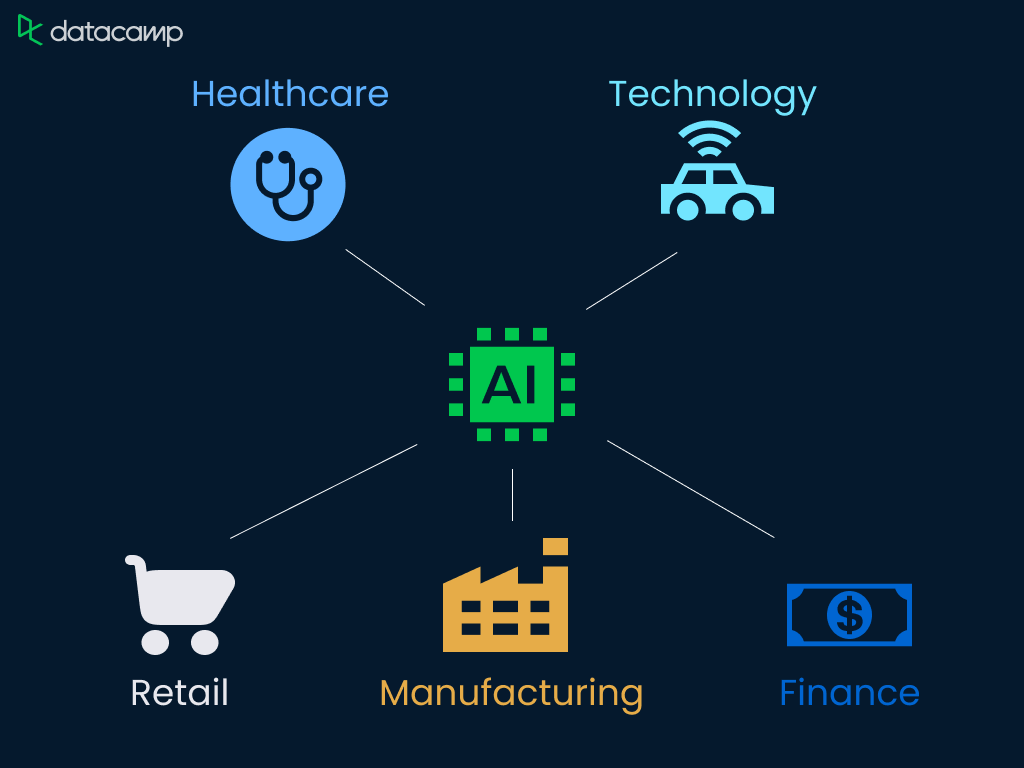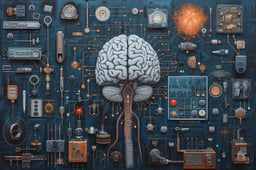Track
Jobs in AI are exploding. But with all the hype, you might wonder—what exactly are the AI careers available, and how do you land one?
This article goes beyond simply listing entry-level AI jobs or senior positions. We'll delve into what it takes to be a leader in this field, whether you're a data science novice eager to embark on your AI career path or a seasoned professional looking to expand your skill set.
The 2026 AI landscape demands deep specialization and innovative thinking. AI advancements are impacting various industries, leading to new roles that require a blend of technical skills, ethical considerations, and creative problem-solving. Understanding these emerging opportunities is crucial for anyone interested in how to get a job in AI.
This guide equips you with the knowledge and strategic foresight needed to navigate the exciting world of AI careers. If you also want to know how to prepare for an AI career, check out our guide on how to learn AI from scratch in 2026. You can also learn about the top AI certifications for 2026.
The Growing Importance of AI in Various Industries
Contrary to popular belief, knowledge of AI and ML won’t be restricted to just software development and work on large learning models (LLMs). Instead, various industries will see an influx of job openings in the coming years—let’s see what these industries are.

AI in healthcare
The healthcare sector demands a nuanced understanding of medical sciences and advanced data analytics for professionals aiming to integrate AI effectively.
Entry into this domain typically requires expertise in machine learning, natural language processing (NLP), image recognition technologies, and a solid grounding in biological sciences or healthcare practices.
AI is revolutionizing healthcare through predictive analytics for patient care management, enhancing diagnostic accuracy with image analysis, and accelerating drug discovery through complex simulations.
Future applications are poised to personalize medicine further, improve remote patient monitoring through wearable AI technologies, and enable smarter decision-making in clinical trials.
AI in finance
Professionals entering AI in finance need a robust foundation in quantitative analysis, machine learning, and knowledge of financial instruments and markets. Proficiency in programming languages like Python, coupled with an understanding of regulatory and ethical considerations, is essential.
AI's current applications in finance include fraud detection through pattern recognition, algorithmic trading using predictive analytics, and personalized banking services via chatbots.
The future of AI in finance looks towards more sophisticated risk management models, enhanced regulatory compliance through automated systems, and deeper personalization of financial advice using AI-driven insights.
If you want to learn more about this, check out the webinar Artificial Intelligence in Finance: An Introduction in Python and the tutorial AI in Finance: Revolutionizing the Future of Financial Management.
AI in technology
The technology sector requires a deep technical proficiency in computer science, software engineering, and specific AI disciplines such as machine learning, deep learning, and robotics.
Experience with cloud computing platforms, big data technologies, and IoT is becoming increasingly important. AI applications in technology range from developing autonomous vehicles and drones, which rely on AI for navigation and safety, to smart home devices that use AI to learn and adapt to users' preferences.
Looking forward, AI is expected to drive innovations in quantum computing, enhance cybersecurity through predictive threat analysis, and further blur the lines between virtual and physical worlds through advanced augmented reality (AR) and virtual reality (VR) applications.
If you’re looking for a learning resource, this is how to become an AI engineer.
AI in manufacturing
Individuals aspiring to enter the AI domain within manufacturing need a strong grasp of industrial engineering, machine learning algorithms, and robotics, along with practical skills in data analytics and IoT device management.
The integration of AI in manufacturing currently focuses on predictive maintenance to prevent equipment failure, optimizing production processes through real-time analytics, and automating quality control with vision systems.
Future trends include the adoption of digital twins to simulate manufacturing processes, advanced robotics for more flexible and autonomous production lines, and AI-driven supply chain optimization to respond dynamically to market changes.
This is a good resource to understand more about how AI is used in manufacturing.
AI in retail
AI applications in retail require expertise in data science, consumer psychology, and e-commerce technologies. Skills in machine learning, NLP for customer service bots, and predictive analytics for inventory management are critical.
AI enhances customer experiences through personalized recommendations, optimizes inventory with demand forecasting, and streamlines operations with automated checkout systems.
The future of AI in retail promises more immersive shopping experiences through augmented reality (AR), improved sustainability in supply chains through data-driven insights, and further personalization of marketing strategies to individual consumer behavior patterns.
If this industry piques your interest, learn more about generative AI in eCommerce.
7 Top AI Job Roles
Few industries haven’t yet been turned upside down by the rapid advancement of AI. Knowing the AI fundamentals will soon be critical for everyone.
For AI-specific job roles, the requirements will be much higher, often requiring specific and high-level knowledge of adjacent subjects. With that in mind, let’s take a look at the seven best jobs in AI you can pursue in 2026.
Before we dig into the details, let’s start with an overview of the jobs we’re going to discuss:
|
Job Title |
Salary Range (USD/year) |
Key Skills |
Focus |
|
AI Engineer |
$114K - $212K |
Programming, NLP, ML, Neural Networks, Cloud |
Design & build AI systems |
|
Data Scientist |
$118K - $206K |
Statistics, ML, Data Processing, Programming |
Analyze data & create data-driven strategies |
|
Machine Learning Engineer |
$126K - $221K |
ML Theory, Algorithms, Model Deployment, Programming |
Build & deploy ML models for real-world use |
|
AI Researcher |
$100K - $186K |
PhD, Research, Programming, Data Analysis |
Push boundaries of AI with new algorithms |
|
Robotics Engineer |
$109K - $200K |
Software Dev, Hardware Eng, Robotics Principles |
Design & implement intelligent robots |
|
AI Product Manager |
$138K - $238K |
AI/ML Expertise, Product Management, Team Leadership |
Develop & manage AI product strategy |
|
Ethics in AI Specialist |
$85K - $170K |
AI Technologies, Ethics, Communication |
Ensure responsible development & use of AI |
1. AI engineer
Salary range: $114K - $212K/yr (Glassdoor)
AI engineers are the architects of AI systems. They design, implement, and maintain AI models and infrastructure, bridging the gap between theoretical data science and practical application.
Their work involves natural language processing, machine learning, neural networks, and cloud applications. This discipline's most important programming languages are Python, Java, R, and C++.
A blend of software development skills and an understanding of advanced AI algorithms is crucial for success in this role. However, many aspiring data professionals are interested in AI engineering due to its practical applications.
To expand, check out the 13 essential AI engineer skills you need to know and learn how to become an AI engineer.
2. Data scientist
Salary range: $118K - $206K (Glassdoor)
Data scientists are the investigators, turning raw data into insights and strategies. They use statistical analysis, machine learning, and data processing techniques to uncover patterns and predict trends.
Their role is critical in making data-driven decisions that guide business strategies. To that end, experience with programming languages like Python or R and a strong foundation in statistics and machine learning is a core requirement for this career path.
DataCamp’s curriculum can help you build a career from scratch and become a data scientist in Python or a data scientist in R.
3. Machine learning engineer
Salary range: $126K - $221K (Glassdoor)
Machine learning engineers specialize in creating algorithms and predictive models that allow computers to learn without being explicitly programmed for specific tasks. This role is pivotal in transforming data science models into applicable AI solutions that can scale across different platforms and environments.
Successful candidates possess a deep understanding of machine learning theory and the practical aspects of deploying them at scale.
An aspiring ML engineer must have proficiency in programming languages such as Python or Java and experience using machine learning libraries like TensorFlow or PyTorch.
These are the top 12 machine learning engineer skills to start your career, and this is how to become a machine learning engineer.
4. AI Researcher
Salary range: $100K - $186K (Glassdoor)
AI researchers push the boundaries of what is possible with AI. They conduct studies and experiments to develop new algorithms, improve existing models, and solve complex problems.
To excel as an AI researcher, one typically needs an advanced degree, such as a PhD in Computer Science or a related field, coupled with a track record of research and publications in AI. This role also demands practical skills in programming and data analysis, using tools and languages such as Python, R, TensorFlow, and PyTorch.
If you want to get more advanced with Python, try this introduction to deep learning with PyTorch and this introduction to Tensorflow in Python.
5. Robotics engineer
Salary range: $109K - $200K (Glassdoor)
Robotics engineers design, test, and implement robotic systems that interact intelligently with their environment. They integrate principles from various branches of engineering, including mechanical, electrical, and computer science, to create robots that can perform tasks autonomously or assist humans.
This role often requires a blend of software development skills for programming robot behaviors and hardware engineering skills for designing physical systems.
Key areas of focus include AI-driven automation, human-robot interaction, improving machine perception, and the development of autonomous vehicles and drones.
6. AI product manager
Salary range: $138K - $238K (Glassdoor)
AI product managers oversee the development and strategy of AI products, from conception through launch and beyond. They work at the intersection of business, technology, and user experience, ensuring that AI solutions meet customer needs while aligning with business goals.
This role demands a unique blend of skills: a solid understanding of AI and machine learning lifecycles, proficiency in product management practices, and the ability to lead cross-functional teams.
AI Product Managers must also navigate ethical considerations and regulatory challenges associated with AI technologies.
7. Ethics in AI specialist
Salary range: $85K - $170K (Glassdoor)
Ethics in AI specialists focus on the moral implications of AI technologies, working to ensure that AI systems are developed and deployed responsibly. They address bias, fairness, transparency, and accountability issues, often developing guidelines and best practices for ethical AI use.
This role requires a deep understanding of AI technologies, ethical theories and strong communication skills to advocate for ethical practices within organizations and across the industry.
Specialists often collaborate with AI researchers, developers, and policymakers to influence the design and regulation of AI systems.
If you want to learn more, you can take this course on AI ethics or read this article on ethics in generative AI.
Required Skills and Qualifications for These Roles
The AI field is dynamic and demands a robust skill set. While formal education in computer science, engineering, mathematics, or a related field can provide a strong foundation for AI, it's not the only path to success. The rise of accessible online learning resources makes it possible to develop the necessary skills independently.
Online platforms like DataCamp offer data science courses and AI fundamentals, providing hands-on experience with real-world datasets and projects. Degrees and certifications from accredited institutions add theoretical depth and credibility to one’s expertise.
AI researchers, however, typically need advanced degrees, such as a PhD, coupled with publications in peer-reviewed journals.
Essential skills for AI professionals
Yes, finding a job in AI requires a broad array of skills. Let’s explore some key areas of focus.
Advanced machine learning techniques
Basic machine learning and advanced deep learning are both essential tools in the AI engineer's toolbox. Proficiency in these algorithms, along with the ability to select and optimize them for specific problems, is crucial.
Here are some resources to help you get started:
- 25 Machine Learning Projects for All Levels
- Machine Learning Courses for All Levels
- Advanced Deep Learning with Keras
Deep knowledge of neural networks
You’ll also need a thorough understanding of various types of neural networks (convolutional neural networks, recurrent neural networks, transformer models) and their applications across different AI tasks.
Here are some valuable resources:
- How Transformers Work: A Detailed Exploration of Transformer Architecture
- Introduction to Deep Neutral Networks
- Building Neural Network (NN) Models in R
- Introduction to Activation Functions in Neural Networks
Proficiency in AI frameworks and tools
Another must-have is knowledge of AI and machine learning frameworks (TensorFlow, PyTorch, Keras) for building and deploying models. Familiarity with AI development tools and environments is essential for efficient model development.
You can start with these resources:
- TensorFlow Tutorial For Beginners
- Introduction to Deep Learning in PyTorch Course
- PyTorch Tutorial: Building a Simple Neural Network From Scratch
Quantitative analysis and statistical methods
And let’s not forget about statistics and the ability to apply statistical tests, data modeling, and evaluation strategies to complex data sets for insightful analysis.
Here are some introductory resources to get you started:
- Introduction to Statistics
- How to Become a Quantitative Analyst
- Statistics Fundamentals with R
- Statistics Fundamentals with Python
Programming languages
Needless to say, you’ll need a good knowledge of programming languages relevant to AI and data science, including Python, R, and possibly Julia or Scala, focusing on libraries and packages that support AI development.
These resources will help you learn everything from scratch:
- Julia Fundamentals
- An Introduction to Machine Learning with Julia
- Introduction to Scala
- Python Programming
- R Programming
Working with large datasets
The foundation for any successful AI project, especially those involving large language models (LLMs), lies in effectively managing large and complex datasets.
SQL remains a powerful language for querying and manipulating data stored in relational databases, allowing you to extract, clean, and transform massive datasets efficiently.
However, for LLMs and other AI applications that rely on high-dimensional vector representations of data, familiarity with vector databases is becoming increasingly important. These specialized databases are optimized for storing and retrieving vectors, enabling efficient similarity searches and accelerating various AI tasks.
These are some of the resources you can use for learning:
- An Introduction to Vector Databases For Machine Learning
- The 5 Best Vector Databases
- SQL Fundamentals
Data visualization
By transforming raw data into clear and compelling visuals, you can extract meaningful insights and effectively communicate them to technical and non-technical audiences.
Here are some resources to consider:
- What is Data Visualization? A Guide for Data Scientists
- Understanding Data Visualization
- Data Visualization Tutorials
- Data Visualization in Python for Absolute Beginners
Natural language processing (NLP)
Knowledge of natural language processing (NLP) encompasses the ability to process and analyze text data using methods like sentiment analysis, language generation (a core capability of LLMs and generative AI), and machine translation.
Resources to get started:
- Master Large Language Models (LLMs)
- Developing Large Language Models
- What is an LLM? A Guide on Large Language Models
- NLP with PyTorch: A Comprehensive Guide
- Understanding Text Classification in Python
Computer vision
It’s also good to consider computer vision techniques for image and video analysis, including object detection, image classification, and facial recognition.
Resources to get started:
- Seeing Like a Machine: A Beginner's Guide to Image Analysis in Machine Learning
- OpenCV Tutorial: Unlock the Power of Visual Data Processing
- Hugging Face Image Classification: A Comprehensive Guide With Examples
- Beginner's Guide to Google's Vision API in Python
Cloud computing and AI infrastructure
Although this relates more to data engineering, it’s a huge plus to understand cloud-based AI services (AWS, Google Cloud AI, Azure AI) and be able to use cloud infrastructure for scalable AI solutions.
Resources to get started:
- Understanding Cloud Computing
- AWS, Azure and GCP Service Comparison for Data Science & AI
- The Pros and Cons of Using LLMs in the Cloud Versus Running LLMs Locally
Industry Insights and Trends
Even though it’s important to know the ins and outs of AI jobs in different industries and at different levels, one can’t navigate the job market without following current trends and market movements.
Will traditional non-AI jobs disappear?
The World Economic Forum suggests that AI and automation will significantly impact jobs across various sectors, with a mixture of job displacement and creation expected. Roles in clerical, secretarial, and certain manual labor sectors will likely decline, while demand for AI specialists, data analysts, and roles in digital technology will grow.
A McKinsey report adds a broader perspective, estimating that activities that account for 30% of the hours currently worked across the US economy could be automated by 2030. This shift could necessitate an additional 12 million occupational transitions until the close of the decade. However, economic growth, innovation, and investment could lead to new job creation that offsets the impacts of automation.
Brookings Institution's analysis further elaborates that automation creates as many jobs as it destroys over time, benefiting workers who can complement new technologies. Yet, it acknowledges the challenges for those directly displaced by machines or whose jobs are easily automated. While AI and automation pose challenges to traditional jobs, they also offer opportunities for new job creation.
The key to navigating this transition successfully lies in skill development, education, and the adaptability of the workforce to the evolving demands of the digital economy.
AI-driven chiplets for enhanced computing efficiency
As Moore's Law faces physical limitations in transistor miniaturization, the concept of chiplets emerges as a groundbreaking solution. Chiplets are small, specialized chips that can be combined to perform the functions of a larger, traditional chip but with increased efficiency and performance.
This modular approach allows for more rapid innovation and customization in computing hardware, catering to the specific needs of AI algorithms and applications.
Exascale computing
Exascale computing is a monumental milestone in computational power, which refers to systems capable of performing at least one exaflop, or a billion billion (quintillion) calculations per second. This level of performance opens unprecedented possibilities for AI, from more accurate climate models to advancements in materials science and bioinformatics, by enabling the processing and analysis of vast datasets at speeds never before achievable.
Bespoke large language models (LLMs) in the Cloud
The trend towards customizing pretrained large language models for specific enterprise needs is gaining momentum. With the aid of cloud-based AI supercomputing and software, businesses can now tailor these LLMs with greater ease, making AI more accessible across industries.
This includes leveraging generative AI to mine unstructured data from enterprise data lakes, find alternatives to AWS for optimal resource utilization, and integrate with key protocols, basing them in the cloud.
Generative AI for industrial digitalization
Integrating generative AI with industrial digitalization transforms how physical entities are replicated in the digital world. By capturing complex aspects of reality—such as geometry, light, and physics—into digital data, generative AI enables more efficient design, optimization, and virtual testing processes. This facilitates the creation of more accurate digital twins and synthetic data, accelerating innovation in manufacturing, autonomous systems, and beyond.
Building Your AI Career
When aspiring data practitioners ask, ‘How do I learn AI and get a job?’ they almost always refer to the knowledge requirements.
While learning Python, R, and fiddling with TensorFlow are all important, they’re just the foundation of a career in AI. In reality, you have to adjust to the dynamic nature of this niche.
Specialize in niche AI technologies
Dive deep into specific areas of AI such as natural language processing, computer vision, or reinforcement learning. Specialization can set you apart and align you with niche market demands.
Contribute to open-source projects
Engaging with the open-source community can provide practical experience and position you higher in the job market. If you’re looking for motivation to get started, check out this code-along on using open source AI models with Hugging Face.
Develop a portfolio of AI projects
Build a robust portfolio demonstrating your expertise in solving complex problems with AI. This should include projects that showcase your ability to work with large datasets, employ advanced machine learning algorithms, and generate tangible results. You can keep all your projects in one place using DataCamp Portfolio.
Stay abreast of AI research
Read and engage with the latest AI research papers regularly, attending conferences such as NeurIPS, ICML, or CVPR. This helps you understand cutting-edge techniques and how they can be applied to solve real-world problems. These are the top data science conferences for 2026.
Master AI deployment and scaling
Learn about the tools and platforms for deploying AI models efficiently at scale, such as Docker, Kubernetes, and cloud services (AWS, Google Cloud, Azure). Understanding the operational aspects of AI is critical for real-world applications.
Network with AI professionals and join AI communities
Engage with the AI community through forums, social media groups, or professional networks like LinkedIn. Networking can provide insights into industry trends, job openings, and collaborative opportunities.
Ethical AI and bias mitigation
Educate yourself on AI ethics, understanding biases in data, and how to develop algorithms responsibly. This is increasingly important as AI becomes more integrated into society.
Interdisciplinary collaboration
AI solutions often require a blend of domain knowledge from fields outside of computer science, such as psychology, linguistics, or healthcare. Collaborating across disciplines can enhance the effectiveness and applicability of your AI projects.
Conclusion
The journey into AI is as challenging as it is rewarding. It offers a landscape filled with opportunities for innovation, growth, and a profound impact on industries and societies worldwide.We hope we’ve successfully underscored the importance of adaptability, continuous learning, and a forward-thinking mindset. For those ready to dive into this dynamic field, the rewards extend beyond personal achievement to contributing to the broader narrative of human progress.
As AI continues to evolve, so will the pathways to success within it. This promises a future where technology and human ingenuity converge to create a world of unlimited possibilities.
Now that you have a good idea about the career paths in AI, we encourage you to start your learning journey with one of these resources:
Worked on large scale enterprise projects and built compliance teams at multiple Fortune 500 companies | Previously - Digital Compliance @ Netflix





